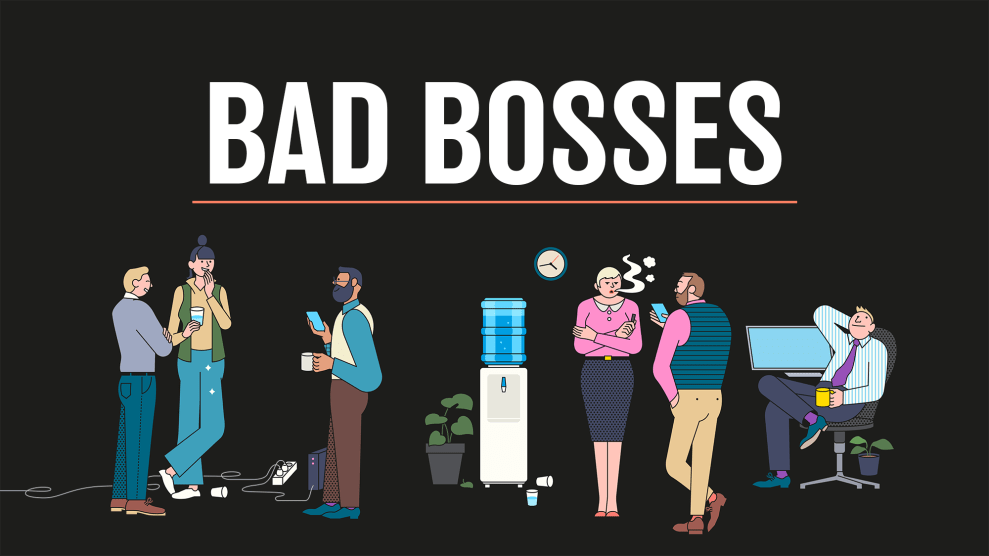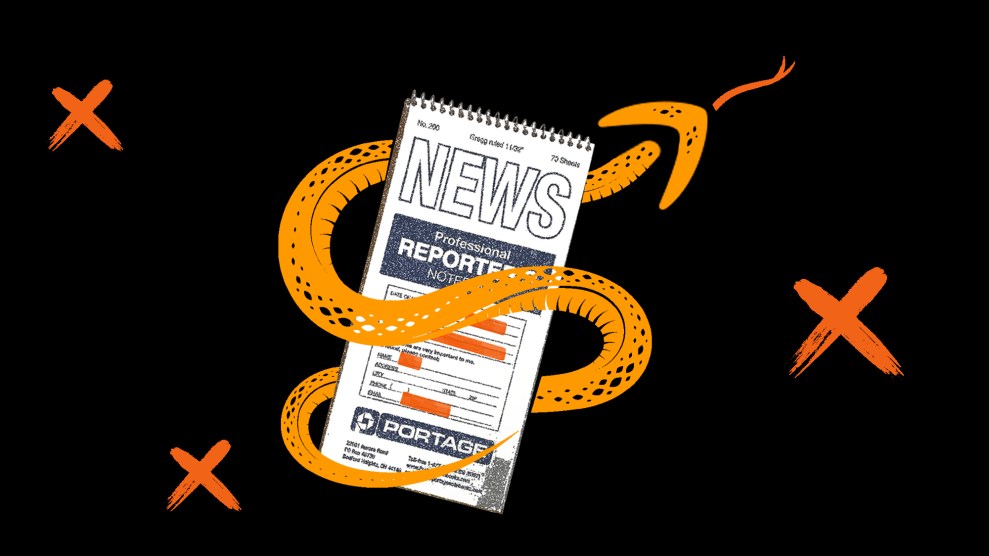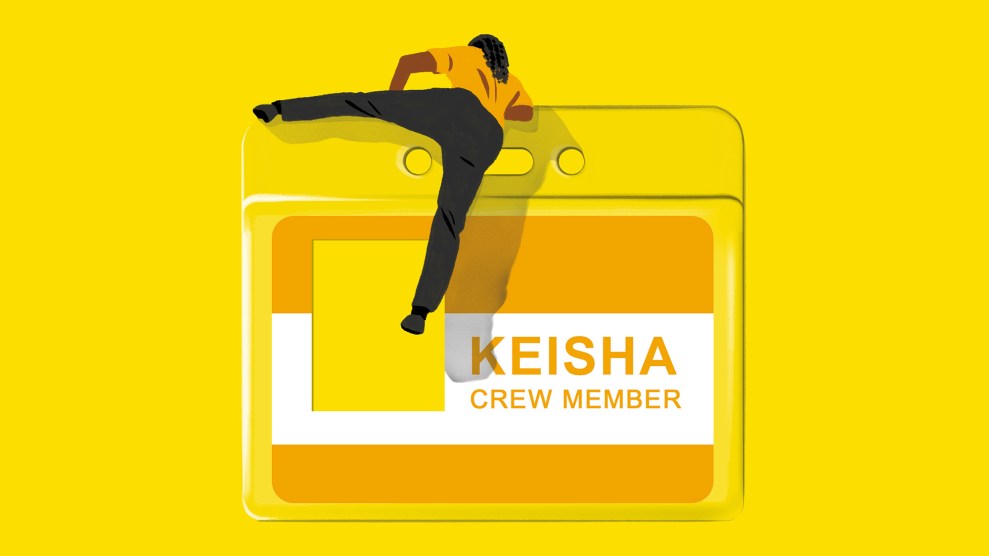In our January + February 2022 cover story, we attempted to answer a simple question: What the hell happened to labor since the pandemic began? It wasn’t one thing. But this package—through a series of worker stories as told in their own voices, interviews with experts, and dissections of media narratives—attempts to make sense of the moment. You can find the full package here.

Amazon has long been accused of treating its workers as expendable. The stories of contract drivers forced to pee in bottles and warehouse employees whose labor is tracked down to the second have become infamous. But the misery doesn’t stop there.
Amazon’s white-collar workers—the ones who write the code and manage relationships with major companies—must endure a corporate culture that is notoriously ruthless compared with those at other major tech companies. This is what it looked like when one of those workers found himself under a boss who embodied Amazon’s obsession with performance and quantifiable results. He asked to be anonymous because he fears retaliation from his current employer.
In response to a request to comment, an Amazon spokesperson said, “While Mother Jones has not provided enough information for us to verify or investigate these claims, the situation described does not reflect our guidance to managers or our performance management policies in respect to employees experiencing personal hardship.” He added, “We work hard to ensure that all employees have what they need to be successful in their roles, including resources for employees who need additional support to navigate challenging personal circumstances or to meet performance expectations.”
I met my wife in 1999 on Yahoo Personals. She was a standup comedian for years. We met, got pregnant, married, and moved all in a year. She was a very cool woman. Being a mom was what she wanted to do. She was just great at it. My daughters are amazing, and I attribute a lot of it to her. They’re 16 and 20.
I started my career doing consulting. Then I went into product management. We moved to California, then we moved to Tennessee. My brother called in 2015 and said, I’ve been diagnosed with pancreatic cancer. I can remember the date and the time because it was just so surreal. He survived 18 months and died in September 2016. He had actually worked for Amazon running seven or eight of the warehouses before he got sick. Typical of Amazon, they worked him a lot.
In February 2017, my wife and daughters decided to take a walk in the park while I was in California. My wife had a grand mal seizure while she was backing out of the driveway. She ended up backing into a school bus. Luckily, my daughters and the kids on the bus were all okay. I got a call from my wife’s friend saying they’re doing a PET scan at the hospital. My wife was diagnosed with brain cancer.
I did a bunch of research on glioblastoma. To some extent, I knew it was a death sentence. But we did our best not to think about it like that. My employer at the time was really great about it. They were really very helpful in trying to make sure that I was okay.
Then one of my friends reached out in July 2018 and said, we have an opening at Amazon that I think you’d be really interested in. It was a pretty short application process. What they offered me was almost $300,000 per year. That was a shitload of money in Tennessee. You can’t really say no, right?
I told them, I can’t move to Seattle. I explained how bad brain cancer was. There were no surprises for anybody, including my boss. I said, if this is an issue, I can’t come work for you. I needed steady health insurance. My wife’s surgery to remove a tumor was $300,000. If I hadn’t had insurance, I’m not sure what I would have done.
The first three months were really about becoming an Amazonian. They indoctrinate you into their way of thinking. There’s nothing in their leadership principles that talks about caring for other people. You hear all these horror stories about Amazon, but you’re not sure you can believe them. As you live that nightmare, you go, shit, it is like that.
Still, the challenges came a little bit out of nowhere. My boss was saying, we’re seeing some things that we’re concerned with. I said, look, I’m having some issues. Every few months my wife would have an MRI. I would be so tense going to the next MRI because tumors were a fairly frequent occurrence. We were just trying to keep my wife alive.
As we got into the end of 2019, I go to my HR department. With my brother’s death—I had explained to Amazon that my brother had died—I never really took the time to grieve. I pushed down the grief. Then my wife got sicker and sicker. I just got more and more depressed. You see no end in sight.
I had a long talk with HR. The response from them was, okay, you have two options here: You go on family leave, or you can perform. Those are your two options. I was thinking, if I take family leave, I get no income. I remember talking to my wife about it and saying, I can’t believe these are my options. So, I ended up trying my best to power through with the added pressure of knowing my boss wasn’t happy with me, even though I’m not sure what I did. I feel like I was doing the things I needed to do.
It went from mild concern from my boss to heavy concern after my conversation with HR. In December, when we’re in a meeting in Vegas, he comes up to me and says, your performance is not what I expect it to be. You and I need to have a conversation. It was really weird timing with me going to HR in November and then him coming back in December and saying, we don’t think you’re working as effectively as you need to.
I remember sitting there thinking, what the hell did I do wrong? Could I have done things better? Definitely. Could I have gone out and been more proficient in some of the things I did? Sure. As you look at your wife’s mortality, that has an impact I didn’t fully register at the time. But I felt like I never got any support from him. I felt like they were looking for the path of least resistance, which was to push me out.
In February 2020, my boss put me on what’s called a Pivot. The Pivots are typically made so that you’ll fail. As an example, I was going to be judged by a metric I had no control over. They give you an option: Do the Pivot or take $30,000 in severance. A week before the Pivot was supposed to end, I finally said, I can’t do this anymore. I was at my wits’ end. I felt like I was going to lose it at any point. Not that I was going to kill myself, but that I was going to be put in a rubber room. I was able to take family leave because I finally realized I was just clinically depressed. I spent from about February until about June working with a therapist trying to work through my issues. I finally got right in my head.
Then I sent this really long note to Amazon saying the person who I was is not the person who I am. Their response was: We started the Pivot process. We don’t have a choice. We have to do this. They cut one of the goals in half, but it was still a huge amount. My boss basically read the letter I sent and had no compassion. It’s just metrics. I’m a cog in the machine. My wife was not getting better. She was going into radiation.
I felt like it didn’t matter what I said or what I did. He was going to get me out. I can’t tell if it was because of taking family leave. He basically had decided that he was going to let me go, regardless. Towards the end of the Pivot, I said, screw it, I’m gonna get a lawyer. The lawyer said that she had gone through a lot of instances like this at Amazon. Getting a lawyer delayed the inevitable by maybe a couple of weeks.
At the end of the Pivot, my boss said I failed. I had the ability to go to a board to explain why I shouldn’t be on Pivot, but the chances of that working were minimal. The lawyer said, let me write a letter. Amazon ended up responding with a 30-page document that I had to address. My boss knew that my wife was in terrible shape. He just didn’t care. He was just one of those people that was kind of a robot. Whatever was happening outside of work didn’t matter. There were a lot of people I worked with that ended up leaving because of him. Amazon truly is an organization that has very little human emotion to it.
That was the middle of July. By the middle of August, they fired me. I refused to sign a severance letter. I said to my lawyer, I’m not signing that unless they give me what I think is fair, which is a year’s worth of salary. The other thing was my next set of 40 shares of stock options were coming in December. I lost about $100,000 because of when they fired me.
In September, my wife went into hospice. She decided to stop all treatments. I was completely heartbroken. I blame Amazon to an extent for what happened to me, but I also blame my boss for the fact that he was so inhumane about this. I think it was probably 60 or 70 percent my boss, and 30 or 40 percent coming from Amazon’s culture.
I tried to explain to my boss, the person I love the most is dying. How would you be able to cope as an employee? He didn’t care at all. I get the sense that Bezos doesn’t really care about your personal life. It’s like, that’s your thing. You gotta care about the work and the work only. That customer obsession is great in theory, but the human impact is devastating for someone like me. I had to go on COBRA. I had no income. I couldn’t work because I didn’t know what was going on with my wife.
My wife died two months later. What if she had survived five months? What would I have done? They gave me three months of COBRA. I had savings so we probably could have lasted a period of time. At some point money would have become an issue, but I would have begged forever to have my wife last longer.
My wife went comatose the last week of her life. It’s part of what happens as people die from glioblastoma. They kind of lose consciousness, but they’re still here with you. I didn’t sleep for eight days. I was watching her die every day. It was awful. If I could come back to my boss, I would like him to understand what it looked like. But I’d never want him to go through it because it was so painful. And still is.
This story is part of our Bad Bosses project, a reported collection of accounts from workers about their terrible bosses and the system that creates them. You can read more about the entire project and find every story here. Annotations—highlighted throughout—can be clicked for further context and comment from other parties. Got your own bad boss story? Send us an email.

















